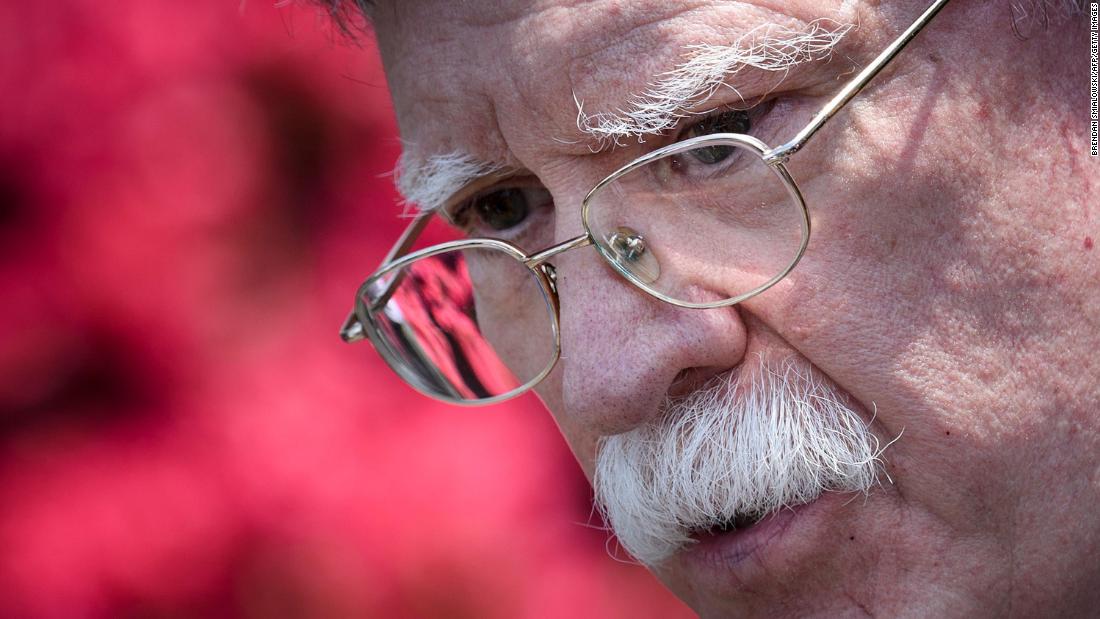[ad_1]
Bolton, whose views of the President’s policies toward Ukraine were cited by multiple impeachment witnesses, hasn’t publicly commented about the events that unfolded last year.
Bolton’s speech on Monday evening at Duke University, the first of two public appearances this week which is billed as focusing on national security challenges facing the country, isn’t expected to directly address the issue of impeachment or the ongoing conflict over the contents of his manuscript though he is due to take questions. His other post-White House public speaking engagements have focused strictly on national security policy though he has not been shy to speak out on issues like North Korea where he disagrees with Trump.
A majority of Republican Senators voted against calling witnesses — including Bolton — to testify during the impeachment trial, sparking criticism from Democrats who said there is more to be uncovered. House Democrats didn’t subpoena Bolton during their inquiry that led to Trump’s impeachment, claiming it would be challenged in the courts and slow the process.
Bolton is also due to appear alongside President Barack Obama’s former national security adviser Susan Rice on Wednesday at Vanderbilt University.
Battle over Bolton’s book
For weeks, Bolton and his lawyers have been embroiled in a battle with the White House over the contents of the book which is due to be published in March — the administration is raising concerns about the publication of classified information that is protected by executive privilege. The White House’s records management office has been responsible for reviewing Bolton’s book and providing feedback, although the office typically reviews manuscripts for information that is protected under executive privilege, and often defers on classified matters to the National Security Council.
Though the book is being reviewed, the White House has not attempted to stop Bolton speaking publicly and has not asked him to not publicly discuss issues related to his time working for Trump.
Last week, Sarah Tinsley, a spokesperson for Bolton, said that he had received a new letter from the NSC addressing the contents of his manuscript, although her statement did not specify whether the NSC would further look to delay the book from publishing. Rather, it pointed to “serious concerns that the process has been thoroughly breached and that it is more about suppressing Ambassador Bolton’s book than about classification issues.”
According to a person familiar with Bolton’s post-departure dispute with the White House, a meeting with Bolton’s lawyers and the NSC to go over the content of the book remains a possibility, although the timing of any such meeting isn’t clear.
The White House has said that it is reviewing the manuscript, a process that can take months, even in the most straightforward of cases. It is also not unusual for the White House to raise concerns over the sensitivity of details written in manuscripts.
Under Executive Order 13526, the US government uses three levels of classification to designate sensitive information: confidential, secret and top secret. Confidential — the lowest level — designates information that if released could damage the country’s national security. The other designations refer to information the disclosure of which could cause “serious” — secret — or “exceptionally grave” — top secret — damage to national security.
The President, Vice President and some agency heads designated by the President, have broad authority over classifying or declassifying information.
Protocol requires every White House official, upon their departure, to turn over “every record that they create that has to do with the duties of the office,” explained one of the sources.
Bolton, a longtime public servant and copious notetaker, destroyed many of his physical notes from his time as national security adviser, as all officials are encouraged to do while they are on the job, a person close to him said.
It also isn’t clear whether the NSC is requesting all hard and soft copies of Bolton’s manuscript, something they would typically do if there was genuine concern about the publication of classified or highly sensitive information. The NSC may also confiscate Bolton’s hard drive if that were the case, although a person close to Bolton said that has not happened.
Bolton began working on his book after he departed the NSC and did not review the notes he took while he was there for the book, a person close to him said.
Possibility book material may be retroactively classified
Bolton’s team is also preparing for the possibility that the administration may try to retroactively classify some of the material in his book — a measure that is uncommon, but not unheard of, due to loopholes in executive order 13526.
“The president is really empowered by the words in this executive authority,” said J. William Leonard, the former director of the information security office which overseas executive branch implementation of the executive order, and former deputy secretary of defense.
“It’s an authority that can be abused and it can weaken the classification system,” Leonard said. “They abuse it to keep the information out of the hands of adversaries that could potentially use the information to harm the country.”
A handful of former Secretary of State Hillary Clinton’s emails, at the heart of the controversy over her use of a private server for government information, were retroactively classified, although in that case, virtually all the emails contained sensitive information that were recategorized as classified after they were sent to Clinton’s unsecure box.
Lawsuits can also result from government intervention in the publication process, as was the case with a book written by former Defense Secretary James Mattis’ Pentagon speechwriter. Retired Navy Cmdr. Guy Snodgrass’ book was held up by the Pentagon’s prepublication review — a different office than the one reviewing Bolton’s manuscript, but one that follows similar protocol. Snodgrass and his lawyer sued the Pentagon, who finally allowed the book’s publication with a few amendments.
[ad_2]
Source link



